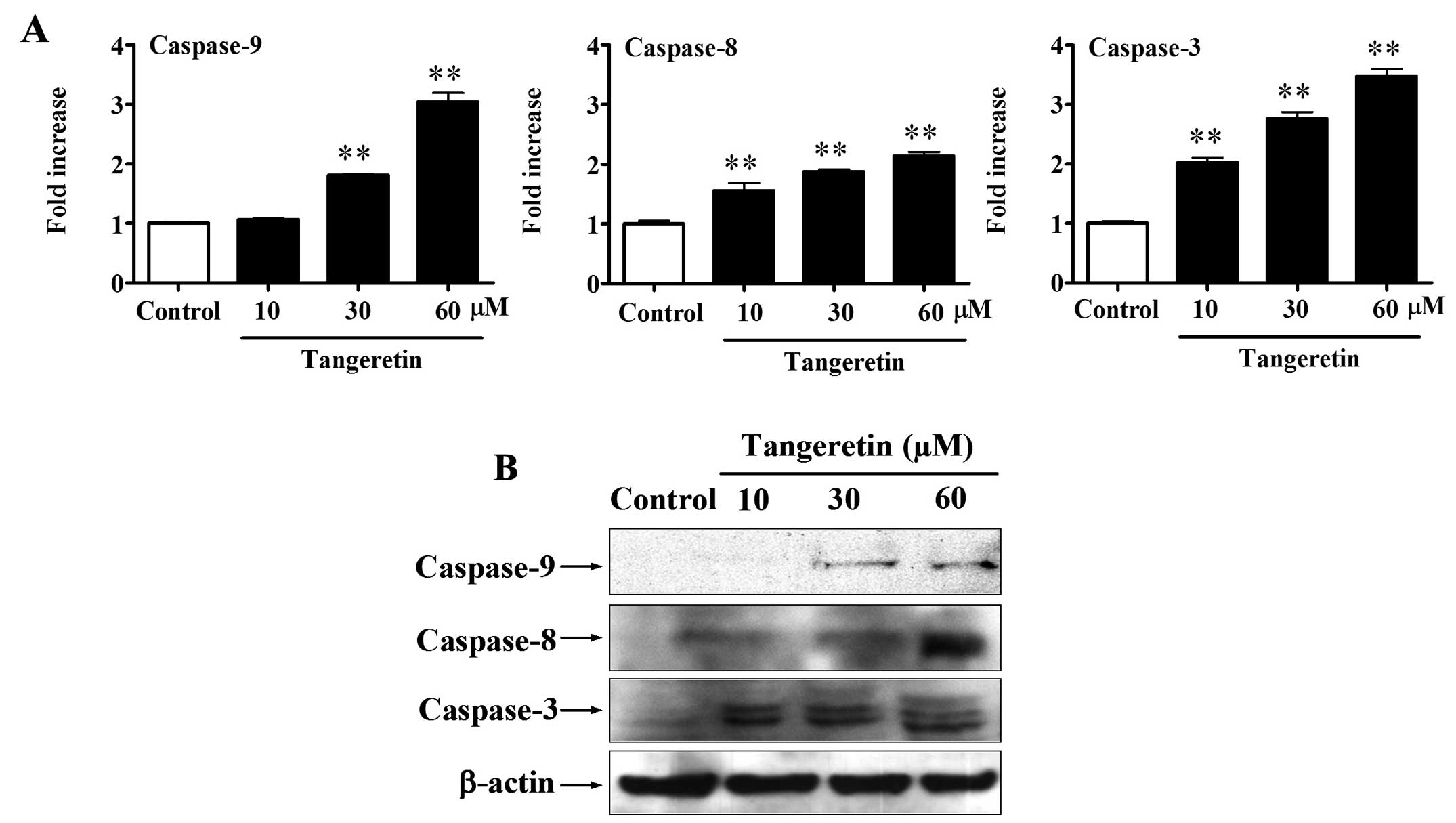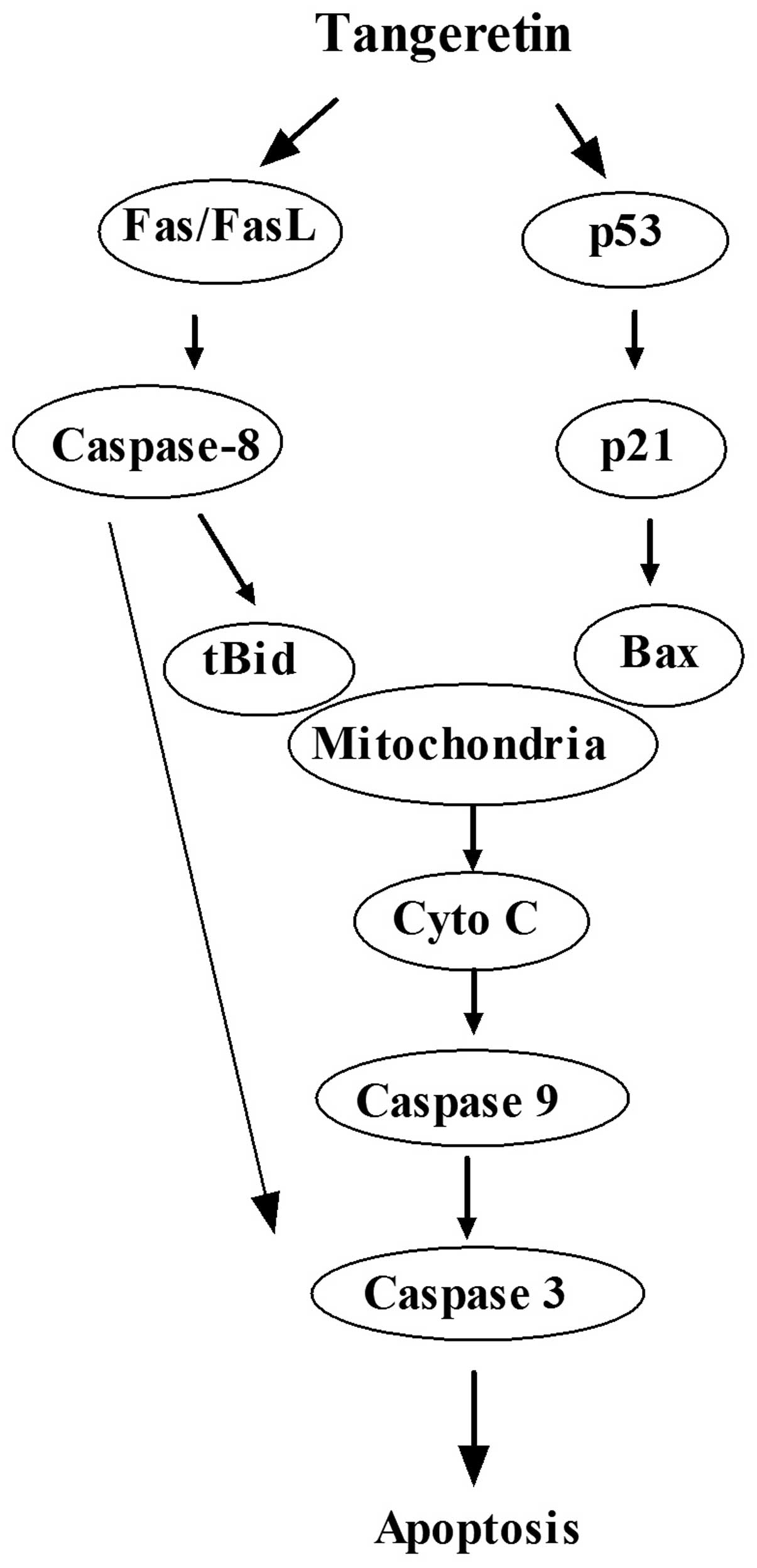|
1
|
Wang D, Wang J, Huang X, Tu Y and Ni K:
Identification of polymethoxylated flavones from green tangerine
peel (Pericarpium Citri Reticulatae Viride) by
chromatographic and spectroscopic techniques. J Pharm Biomed Anal.
44:63–69. 2007. View Article : Google Scholar : PubMed/NCBI
|
|
2
|
Hirano T, Abe K, Gotoh M and Oka K: Citrus
flavone tangeretin inhibits leukaemic HL-60 cell growth partially
through induction of apoptosis with less cytotoxicity on normal
lymphocytes. Br J Cancer. 72:1380–1388. 1995. View Article : Google Scholar : PubMed/NCBI
|
|
3
|
Rooprai HK, Kandanearatchi A, Maidment SL,
et al: Evaluation of the effects of swainsonine, captopril,
tangeretin and nobiletin on the biological behaviour of brain
tumour cells in vitro. Neuropathol Appl Neurobiol. 27:29–39. 2001.
View Article : Google Scholar : PubMed/NCBI
|
|
4
|
Martinez Conesa C, Vicente Ortega V, Yanez
Gascon MJ, et al: Treatment of metastatic melanoma B16F10 by the
flavonoids tangeretin, rutin, and diosmin. J Agric Food Chem.
53:6791–6797. 2005.PubMed/NCBI
|
|
5
|
Manthey JA and Guthrie N:
Antiproliferative activities of citrus flavonoids against six human
cancer cell lines. J Agric Food Chem. 50:5837–5843. 2002.
View Article : Google Scholar : PubMed/NCBI
|
|
6
|
Ishii K, Tanaka S, Kagami K, et al:
Effects of naturally occurring polymethyoxyflavonoids on cell
growth, P-glycoprotein function, cell cycle, and apoptosis of
daunorubicin-resistant T lymphoblastoid leukemia cells. Cancer
Invest. 28:220–229. 2010. View Article : Google Scholar : PubMed/NCBI
|
|
7
|
Morley KL, Ferguson PJ and Koropatnick J:
Tangeretin and nobiletin induce G1 cell cycle arrest but not
apoptosis in human breast and colon cancer cells. Cancer Lett.
251:168–178. 2007. View Article : Google Scholar : PubMed/NCBI
|
|
8
|
Pan MH, Chen WJ, Lin-Shiau SY, Ho CT and
Lin JK: Tangeretin induces cell-cycle G1 arrest through inhibiting
cyclin-dependent kinases 2 and 4 activities as well as elevating
Cdk inhibitors p21 and p27 in human colorectal carcinoma cells.
Carcinogenesis. 23:1677–1684. 2002. View Article : Google Scholar
|
|
9
|
Chen KH, Weng MS and Lin JK: Tangeretin
suppresses IL-1beta-induced cyclooxygenase (COX)-2 expression
through inhibition of p38 MAPK, JNK, and AKT activation in human
lung carcinoma cells. Biochem Pharmacol. 73:215–227. 2007.
View Article : Google Scholar : PubMed/NCBI
|
|
10
|
Lust S, Vanhoecke B, Van Gele M, Philippe
J, Bracke M and Offner F: The flavonoid tangeretin activates the
unfolded protein response and synergizes with imatinib in the
erythroleukemia cell line K562. Mol Nutr Food Res. 54:823–832.
2010. View Article : Google Scholar : PubMed/NCBI
|
|
11
|
Arafa el SA, Zhu Q, Barakat BM, et al:
Tangeretin sensitizes cisplatin-resistant human ovarian cancer
cells through downregulation of phosphoinositide 3-kinase/Akt
signaling pathway. Cancer Res. 69:8910–8917. 2009.PubMed/NCBI
|
|
12
|
Gao J, Senthil M, Ren B, et al: IRF-1
transcriptionally upregulates PUMA, which mediates the
mitochondrial apoptotic pathway in IRF-1-induced apoptosis in
cancer cells. Cell Death Differ. 17:699–709. 2010. View Article : Google Scholar : PubMed/NCBI
|
|
13
|
Jiang XH, Wong BC, Lin MC, et al:
Functional p53 is required for triptolide-induced apoptosis and
AP-1 and nuclear factor-κB activation in gastric cancer cells.
Oncogene. 20:8009–8018. 2001.PubMed/NCBI
|
|
14
|
Linke SP, Clarkin KC and Wahl GM: p53
mediates permanent arrest over multiple cell cycles in response to
γ-irradiation. Cancer Res. 57:1171–1179. 1997.PubMed/NCBI
|
|
15
|
Midgley CA, Owens B, Briscoe CV, Thomas
DB, Lane DP and Hall PA: Coupling between gamma irradiation, p53
induction and the apoptotic response depends upon cell type in
vivo. J Cell Sci. 108:1843–1848. 1995.PubMed/NCBI
|
|
16
|
Goldstein I, Marcel V, Olivier M, Oren M,
Rotter V and Hainaut P: Understanding wild-type and mutant p53
activities in human cancer: new landmarks on the way to targeted
therapies. Cancer Gene Ther. 18:2–11. 2011. View Article : Google Scholar : PubMed/NCBI
|
|
17
|
Dong Y, Ji G, Shi JR, Cao AL, Xie JQ and
Wu DZ: Arrest of human gastric cancer AGS cells by tangeretin via
cyclinB1 upregulation and inhibition of ERK phosphorylation. Chin
Pharmacol Bull. 28:52012.
|
|
18
|
Cohen GM: Caspases: the executioners of
apoptosis. Biochem J. 326:1–16. 1997.
|
|
19
|
Budihardjo I, Oliver H, Lutter M, Luo X
and Wang X: Biochemical pathways of caspase activation during
apoptosis. Annu Rev Cell Dev Biol. 15:269–290. 1999. View Article : Google Scholar : PubMed/NCBI
|
|
20
|
Dias N and Bailly C: Drugs targeting
mitochondrial functions to control tumor cell growth. Biochem
Pharmacol. 70:1–12. 2005. View Article : Google Scholar : PubMed/NCBI
|
|
21
|
Schulze-Osthoff K, Ferrari D, Los M,
Wesselborg S and Peter ME: Apoptosis signaling by death receptors.
Eur J Biochem. 254:439–459. 1998. View Article : Google Scholar
|
|
22
|
Rao RV, Ellerby HM and Bredesen DE:
Coupling endoplasmic reticulum stress to the cell death program.
Cell Death Differ. 11:372–380. 2004. View Article : Google Scholar : PubMed/NCBI
|
|
23
|
Zamzami N, Marchetti P, Castedo M, et al:
Sequential reduction of mitochondrial transmembrane potential and
generation of reactive oxygen species in early programmed cell
death. J Exp Med. 182:367–377. 1995. View Article : Google Scholar : PubMed/NCBI
|
|
24
|
Zamzami N, Marchetti P, Castedo M, et al:
Reduction in mitochondrial potential constitutes an early
irreversible step of programmed lymphocyte death in vivo. J Exp
Med. 181:1661–1672. 1995. View Article : Google Scholar : PubMed/NCBI
|
|
25
|
Kudla G, Montessuit S, Eskes R, et al: The
destabilization of lipid membranes induced by the C-terminal
fragment of caspase 8-cleaved bid is inhibited by the N-terminal
fragment. J Biol Chem. 275:22713–22718. 2000. View Article : Google Scholar : PubMed/NCBI
|
|
26
|
Roucou X, Montessuit S, Antonsson B and
Martinou JC: Bax oligomerization in mitochondrial membranes
requires tBid (caspase-8-cleaved Bid) and a mitochondrial protein.
Biochem J. 368:915–921. 2002. View Article : Google Scholar : PubMed/NCBI
|
|
27
|
Schug ZT, Gonzalvez F, Houtkooper RH, Vaz
FM and Gottlieb E: BID is cleaved by caspase-8 within a native
complex on the mitochondrial membrane. Cell Death Differ.
18:538–548. 2011. View Article : Google Scholar : PubMed/NCBI
|
|
28
|
Vousden KH and Lu X: Live or let die: the
cell’s response to p53. Nat Rev Cancer. 2:594–604. 2002.
|
|
29
|
Cui Q, Yu JH, Wu JN, et al: P53-mediated
cell cycle arrest and apoptosis through a caspase-3-independent,
but caspase-9-dependent pathway in oridonin-treated MCF-7 human
breast cancer cells. Acta Pharmacol Sin. 28:1057–1066. 2007.
View Article : Google Scholar : PubMed/NCBI
|
|
30
|
Lu L, Dong Y, Shi JR and Wu DZ: Tangeretin
enhances the proliferation inhibition of 5-fluorouracil in human
gastric cancer AGS cells. Chin Pharmacol Bull. 27:760–763.
2011.
|
|
31
|
Bunz F, Dutriaux A, Lengauer C, et al:
Requirement for p53 and p21 to sustain G2 arrest after DNA damage.
Science. 282:1497–1501. 1998. View Article : Google Scholar : PubMed/NCBI
|
|
32
|
Kurland JF and Meyn RE: Protease
inhibitors restore radiation-induced apoptosis to Bcl-2-expressing
lymphoma cells. Int J Cancer. 96:327–333. 2001. View Article : Google Scholar : PubMed/NCBI
|






















